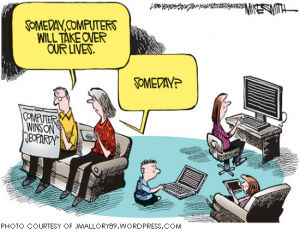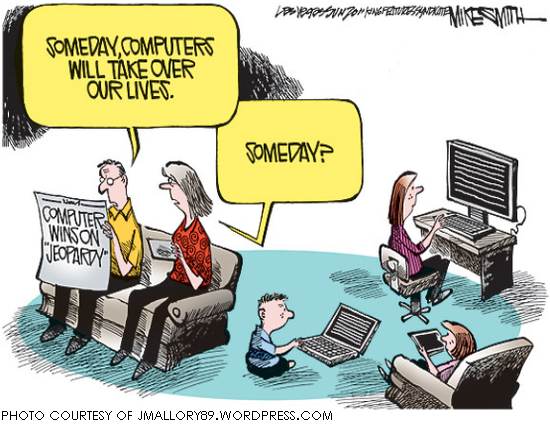
Is this generation smarter than the last?
It’s hard to imagine a life without computers. This generation is privy to vast amounts of information available at our fingertips; nearly any question we have can easily be answered with the tapping of a few buttons and a quick scan of the internet.
The previous generation was not so fortunate. It was infinitely more difficult to find the answers to random questions–no contest. Each inquiry would require a trip to the library or a call to a wise relative. Most questions went unanswered because who has the time to run a trip to the library for every single muse?
Life today is infinitely easier than in the past. After numerous computer advancements technology is mainly created for convenience. There is now there is a something for everything–speakers in our phones so we don’t have to lug around a giant stereo, e-readers for our books so we don’t have to go to the store, escalators so we don’t have to walk up the stairs–the list goes on.
Google, especially, screams convenience. Collecting random bits of information has never been easier. Why is the sky blue? Where was the first American flag woven together? What do hummingbirds eat?
However, just as Katie Lepi mentions in Edudemic, if information is readily available and quicker to find, does this also mean we forget the information faster too?
Previous generations committed more knowledge to memory–which makes sense. They didn’t have the internet itching in the back of their minds; whatever they learned had to be committed to memory or else they’d have to make a trip back to the library to find the same information all over again.
For this generation, as Lepi wrote, “information is so readily available, we don’t often take the time to encode the information into our brains. So the next time we need to remember that information, it is likely that we’ll need to look it up again.”
Consider, though, that technology like Google does greatly improve most aspects of our lives. For example, imagine having to write a research paper without the use of the internet. The process would become infinitely more tedious–no contest. An assignment like that depicts a lone student holed up in a library, the entire table loaded with books filled with information that the poor student will only need about ten percent of.
But does the mere presence of the internet equal a smarter people?
John Robison in Psychology Today mentioned that “When the machines give us answers, we seem superficially smarter, but we really are dumber, because we’re not building the networks in our brains to solve a whole host of problems.”
He believes that if we stop “filling our memory banks” we become more and more reliant on computers. Take his navigation example. Most teens these days (myself included) have a difficult time getting around without their GPS. It makes sense though, why would I commit the route to memory when I can look it up once more the next time I need to go there?
However this, among many other instances, causes us to “become slaves to machines out of intellectual laziness, and the laziness makes [us] less smart,” Robison wrote.
He describes that basic skills such as navigating a hometown also helps us solve other problems, that a life without computers contributes to basic life skills. When we rely on technology this heavily and run into situations where the computer doesn’t know, then we won’t know either because we only know as much as the computer does.
And where does that leave us?
Tomas Chamorro-Premuzic wrote in Psychology Today that “Life has become more complex but we hardly ever notice it because technology has made complexity simpler than ever.”
Against everything I have said, there are more factors to consider. There’s no need to denounce the internet. Would I have been able to write this article with such efficiency as I have this past week? No. Finding these sources would have been much more difficult and extremely tedious. The information John Robison and Tomas Chamorro-Premuzic provided me would most likely have been unavailable in my school library, causing the content of this article to be entirely different.
And so, technology makes us both dumber and smarter. Dumb in the sense that we are lazier, smarter in the sense that we are more efficient.

Leave a Reply